Evidently, the reassuring words from members of Hong Kong’s ruling establishment were not meant to be taken at face value. It is getting to be a habit.
The words followed a vociferous campaign spearheaded by former Hong Kong Chief Executive Leung Chun-ying to have Hong Kong’s Foreign Correspondents’ Club evicted from its government-owned clubhouse.
He saw it as fitting punishment for the management’s insistence on inviting Hong Kong independence advocate Andy Chan Ho-tin to give a luncheon talk last August.
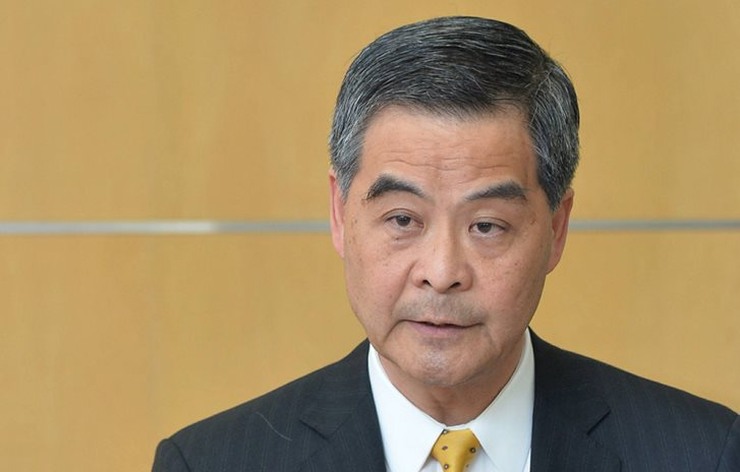
Chan had just been warned by the Hong Kong government that it was preparing to ban his Hong Kong National Party as a threat to national security and public order. Most foreign correspondents knew little about this small advocacy group so the invitation followed naturally from the sudden burst of publicity created by this unprecedented and draconian measure.
China’s Foreign Ministry asked the FCC to cancel Chan’s talk. The Board of Governors refused, and the talk went ahead on August 14.
Within hours afterwards, pro-establishment Legislative Councillors held a press conference where they took up CY Leung’s theme to demand punishment for the FCC. But at that point, cooler heads seemed to take over.
Chief Secretary Matthew Cheung Kin-chung, Number Two in the Hong Kong government hierarchy after Chief Executive Carrie Lam, also spoke to the press that day. He said the government had a “cordial relationship” with the FCC and was not looking to damage those ties.
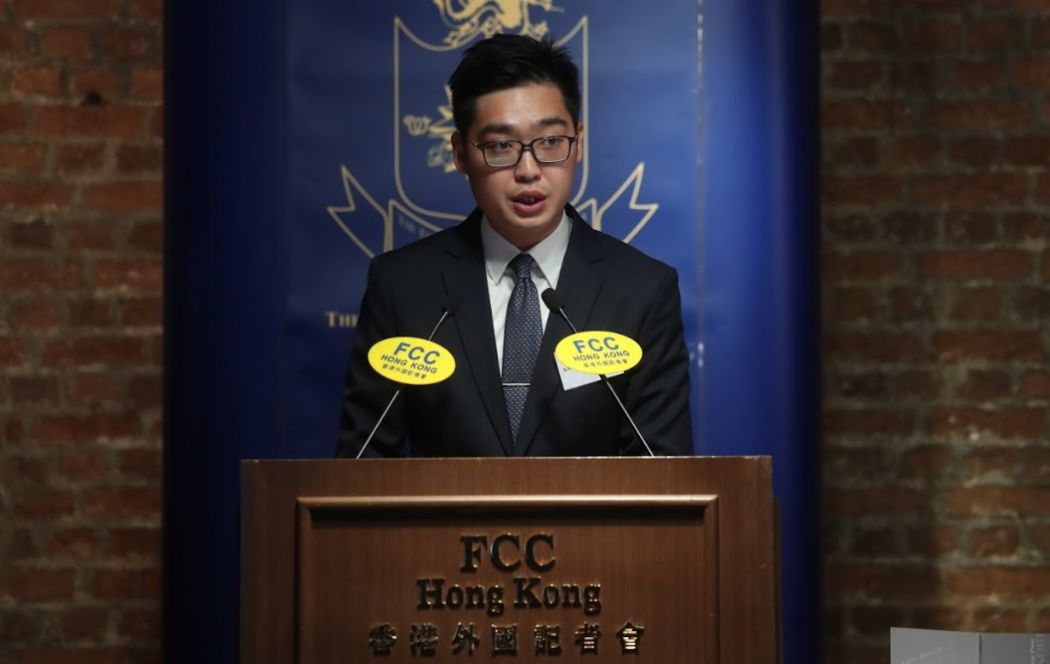
A few days later, Regina Ip Lau Suk-yee said there was no cause for alarm. A member of both the Executive and Legislative Councils, she told a TV interviewer that the 32 Legislative Councillors who had spoken out and submitted their protest petition on August 14 were just expressing themselves as a political gesture, which she herself had declined to join.
Ip said punishing the FCC as they had demanded would harm Hong Kong’s valued international reputation, a reputation earned by much hard work on the government’s part to accommodate the international media.
More FCC fallout
Evidently, something has changed between then and now because the Hong Kong government, in another unprecedented move, refused to renew the work visa of veteran newsman and Asia news editor of the Financial Times, Victor Mallet.
There is as yet no explanation. The October 5 announcement came from his London-based employer. He was given a week to wind up his affairs, pack his bags, and leave town.
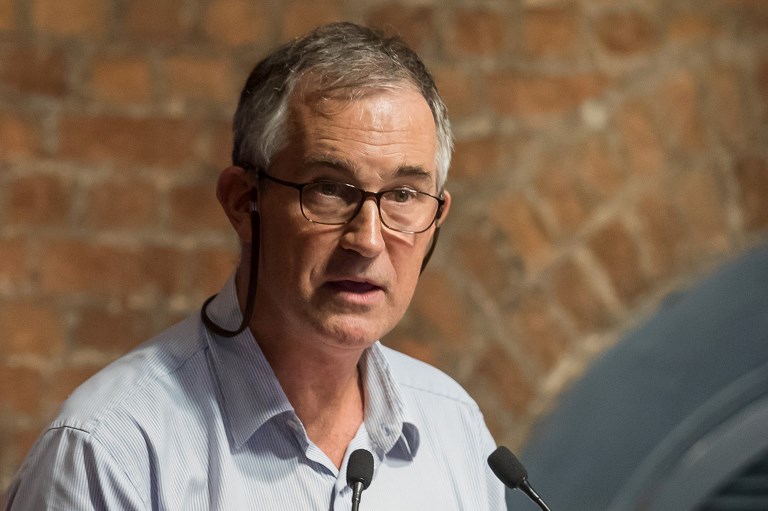
Mallet was transferred to Hong Kong in 2016. He has served as the FCC’s first vice-president since late last year and was the person in charge when the FCC’s invitation was extended to Andy Chan, as well as when the decision was made by the Board of Governors to ignore Beijing’s protest.
He also hosted Chan’s August 14 talk. Hence he is the logical person to bear the brunt of Beijing’s wrath, if that is the official intention.
A formal banning
So, this is how it begins. One small step at a time, easily absorbed and explained away – at least in the beginning. The drift has been apparent for most of this year after Hong Kong officials began their awkward attempts to redefine many things that had been taken at face value.
The redefinitions followed President Xi Jinping’s “red line” declaration against all suggestions of independence for Hong Kong. His declaration was made in his July First speech last year, celebrating the 20th anniversary of Hong Kong’s 1997 return to Chinese rule.
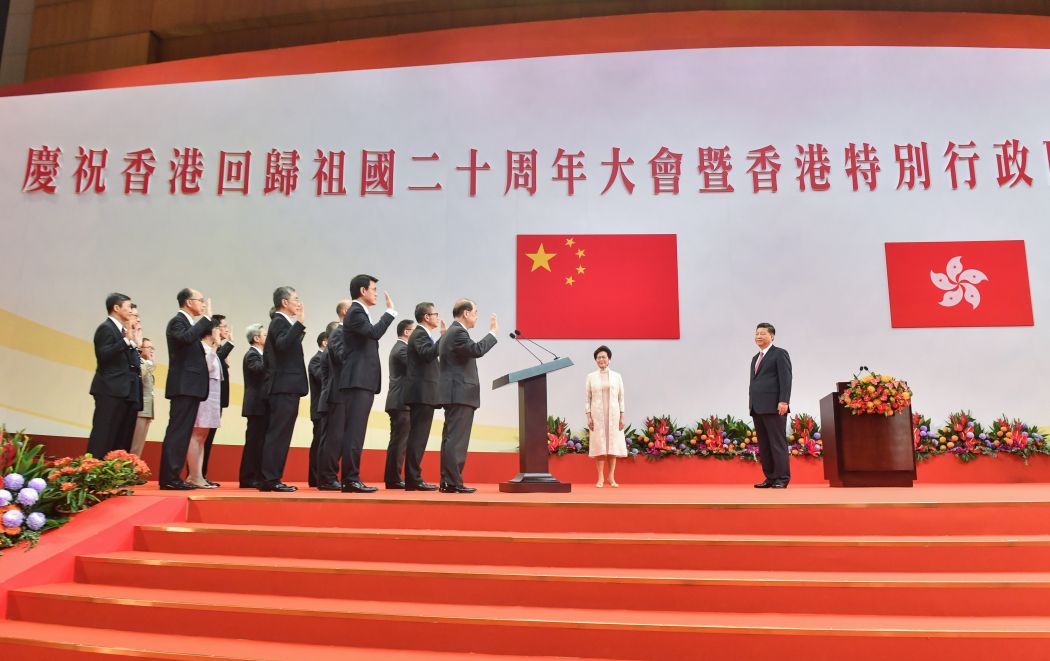
Of course, free speech is guaranteed, says Lam. It is just that independence has nothing to do with free speech!
It follows that a free press might or might not be able to report on those who advocate independence. “Down with one-party rule” can still be shouted from the rooftops. But those who shout cannot expect to qualify as candidates in Hong Kong elections, and so on.
Lam repeated the contradiction at a press conference this week: “Freedom of expression and of the press are Hong Kong’s bedrock core values,” she said. The government will continue to safeguard all such rights, which are enshrined in Hong Kong’s Basic Law.
It is just that Hong Kong independence lies beyond the pale, not to be tolerated in any form because it threatens national security and China’s territorial integrity.
But the trend is escalating. It is no longer just a game of wits and semantics. In announcing the National Party’s official banning on September 24, Hong Kong’s Secretary for Security warned of severe consequences.
Anyone associating with Andy Chan’s political group, or participating in its activates, or contributing to its finances could, if convicted, be liable to a fine or a prison sentence of up to three years.
What to do? Hongkongers have grown accustomed to associating, participating, and contributing as they please. But by now, especially over the past year as they have watched the trend develop, people are learning to adapt, with some amusing consequences that may nevertheless land the perpetrators in court or worse.
National day: self-censorship on the march
October 1 is China’s National Day and, since 1997, a public holiday for Hong Kong. Although not a major traditional day of protest on the local calendar, a low-key march was organised this year by Hong Kong’s Civil Human Rights Front.
Marchers followed their usual route from the Causeway Bay shopping district to government headquarters downtown. But if the routines were unremarkable their significance was not. The protest emerged as a real-time test, a kind of learning experience for self-censorship on the march.
There was little advance promotion, even in Apple Daily. But much thought obviously went into the planning. The theme for the day was carefully chosen to sidestep the subject foremost on marchers’ minds. The lead banner read: “Reject City Dangers.” (拒絕危城).
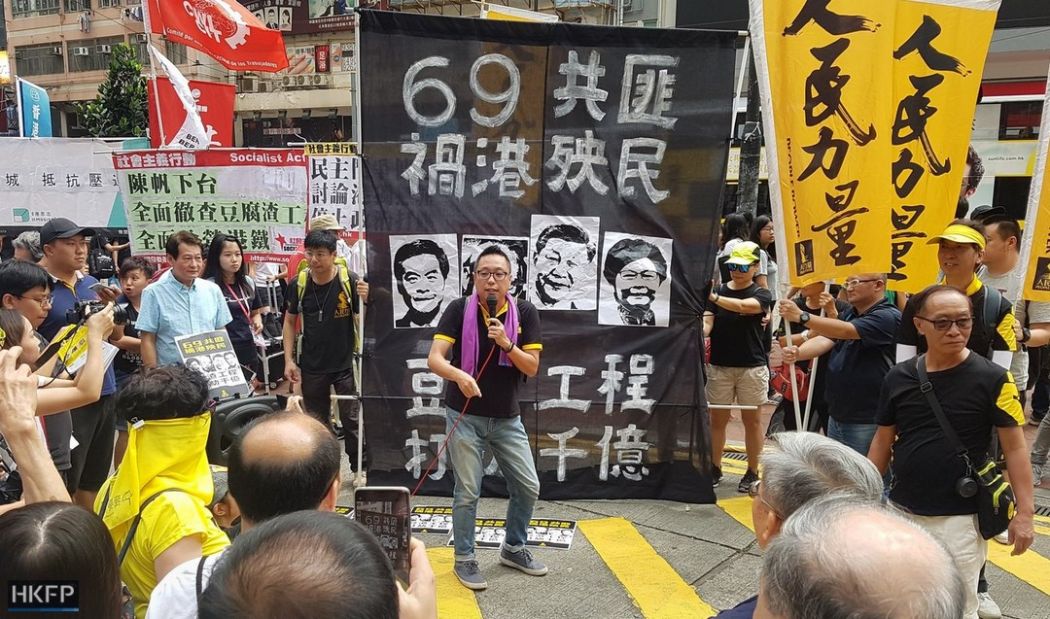
It referred to current municipal controversies over shoddy and potentially dangerous work on mass transit construction sites. Not a burning issue, to be sure, but perfectly safe and politically sound with nothing the police could use against the organisers. They even had turnout estimates not too far apart, for a change – 1,250 and 1,500, respectively.
Of course, there were some suspicious slogans scattered throughout the crowd, enough to keep the police and their plainclothes counterparts and their recording devices fully occupied. The follow-up tagline was a statement about safe and secure cities being the foundation of a safe and secure nation.
But most of the participating groups and individuals carried nostalgic banners and posters that evoked memories of the old days when hopes could still be high about freedom, democracy, and universal suffrage.
The Human Rights Front still follows the same rules, in place since its first big demonstration in 2003. All groups can participate as they like, but they must agree to the main theme and the slogans that lead the march so that everyone who marches identifies with the message on the lead banners. But not everyone agrees with the slogans of everyone else who marches.
This custom was especially useful on October 1 since, by prior agreement with the organisers, two pro-independence groups – about 30 people in all – decided to test the waters. They called themselves the Students Independence Union and the Hong Kong National Front, and they did not actually join the march.
Instead, they crashed the party at its half-way point, Southorn Playground in Wanchai. They then walked only a short distance beside the main line of march before furling their banners and disappearing into the crowd of onlookers.
The contingent chanted among other things “Hong Kong is not China” and carried the Catalonian flag to signify their identification with the Spanish region seeking independence from Spain. Hence the main march organisers could not be blamed, nor could anyone else in the march.
After this catch-me-if you-can routine, the independence advocates will have to wait and see how efficient the police surveillance videos might turn out to be.
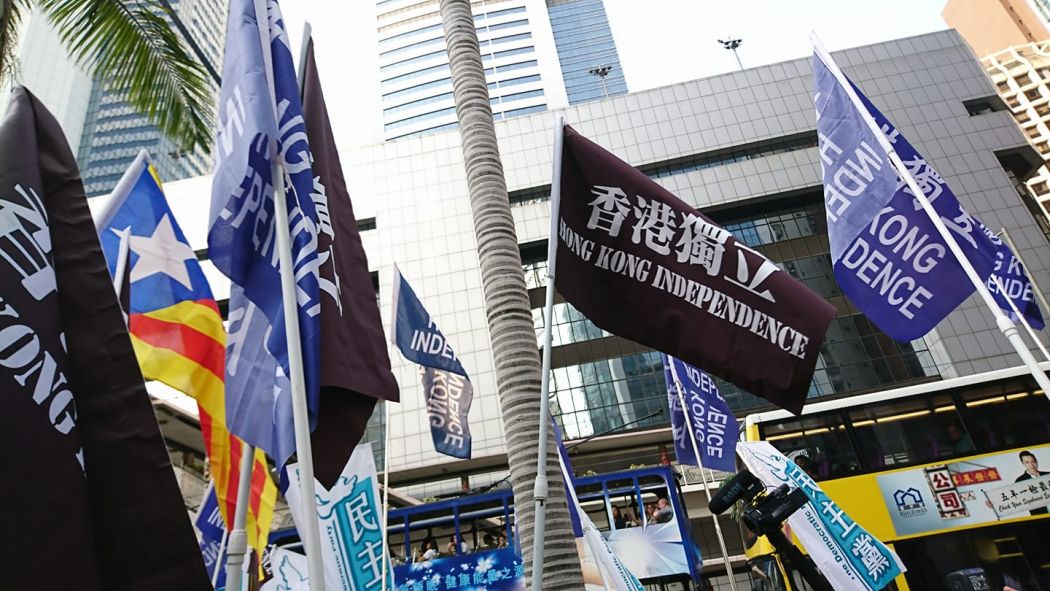
Talking to reporters, individual group members nevertheless acknowledged their own “red line.” They were careful not to mention Andy Chan’s banned National Party – a precaution that was actually taken by all the participants.
Slogans about Chan and his party were noticeable by their absence. It was an appropriate tribute of sorts since he himself has made a point of dismissing such demonstrations as a waste of time.
Ironically, the independence groups themselves needed police protection at the playground flash-point. There might have been a serious altercation since some angry pro-Beijing hecklers were lying in wait with their patriotic fervour shouted out loud and clear. “This is China,” read their lead placard, calculated to provoke a fight and they were ready for it. Police lines struggled to keep the two sides apart.
Independence banners reappeared briefly when marchers arrived at government headquarters but soon disappeared again after a brief scuffle with security guards. They would not allow any suggestion of such disrespect to enter the Civic Square public entrance.
Even one much-photographed placard reading “Without Independence, Hong Kong is China” was not allowed to enter. Its creator argued that he was not actually advocating independence, only stating the obvious but the guards were not impressed.
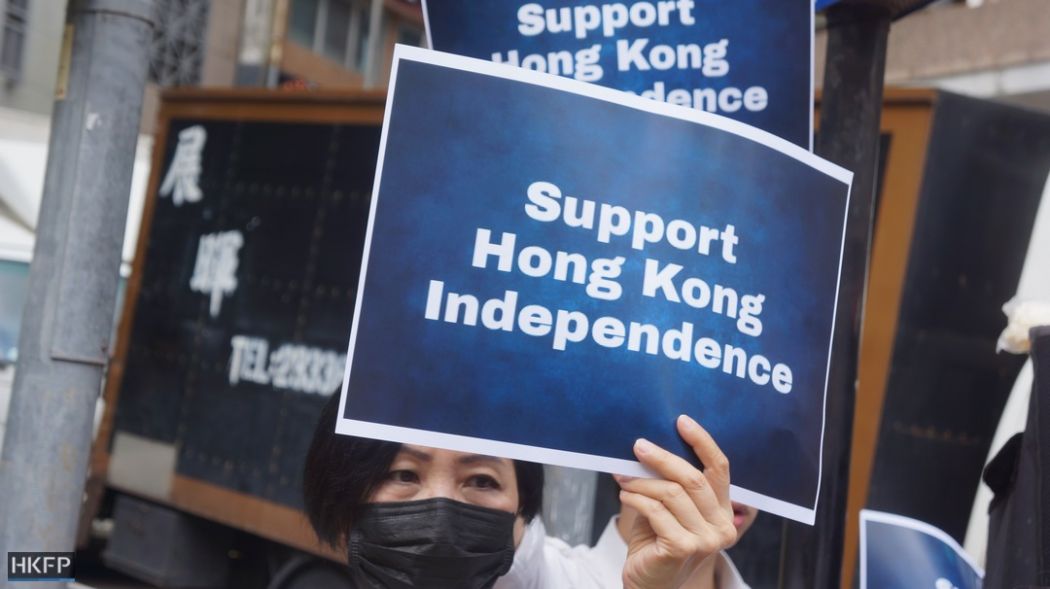
Net result: the government has evidently succeeded in banning Andy Chan and his National Party. They have become words that must not be spoken and the subject that must not be discussed.
Still, there remains another word: “independence.” It might be banned as well, but what can be done to erase the concept and condition from the public mind?
Hong Kong Civil Hub: buried by the SCMP?
The idea of “burying” a story involves the sharing of information publications may not want to feature but, for whatever reason, don’t feel free to spike. They find obscure places to post it, so that the item can still be found, except that no one has any way of knowing it exists – much less where to look for it.
Perhaps Hong Kong’s main news publications performed such a sleight-of-hand with Hong Kong Civil Hub (公民連繋), a new pro-democracy platform that seems to have fallen by the wayside.

The first reason to suspect the South China Morning Post is that its September 27 news item appeared only on SCMP.com, but nowhere else: neither in the daily print edition of the paper nor the daily online news selection.
The second reason for suspicion is the forthright language in the new Hong Kong Civil Hub’s inaugural publication, calculated to be as provocative as possible and far beyond what SCMP editors now seem to regard as news that’s politically fit to print. The title of the first issue: “China’s Sharp Power in Hong Kong.”
The third reason for suspicion is the editorial design of the item, in that the SCMP did post, interrupted throughout with distracting links to more politically correct copy, about Hong Kong students defying proper university authority; about Beijing renewing calls for Hong Kong to enact national security legislation after the Hong Kong National Party ban; and an opinion piece about Beijing’s reasons for being pleased with the achievements of Carrie Lam’s administration, which now include the National Party ban.
Pro-Beijing commentators say it is all right for students to discuss independence, as long as it is placed in the politically correct negative context. The SCMP’s report seems well-designed toward that end.
On the new Civil Hub itself, prominent pro-democracy campaigners are lending their names to the project. They include student activist Joshua Wong; democracy movement elder Martin Lee; and veteran labour rights campaigner Lee Chuk-yan, as well as university professors Benny Tai and Chan Kin-man.
The professors are two of the three original Occupy Central organisers whose trial for their role in that campaign, on charges of inciting public unrest, is due to begin next month.
All of these activists are excoriated almost every day in a pro-Beijing media blitz that has been underway for months. And from Beijing’s perspective, the reasons for its wrath are clearly spelt out by Hong Kong Civil Hub in its inaugural publication.
These campaigners are finally taking a stand to say directly what has long been said here in more cautious circuitous ways. But they also go a step further than ever before by placing Hong Kong in a wider international context. They argue that the Chinese government is no longer using only “soft power” to win friends and influence people around the world.
Beijing is now applying sharper more coercive methods to promote its interests and enforce its will, methods similar to those also being used in Hong Kong.
Beijing is especially exerting pressure on the Hong Kong government to tighten its grip here with multi-pronged harassment, intimidation, and legal methods that are shrinking the spaces democracy activists need for survival.
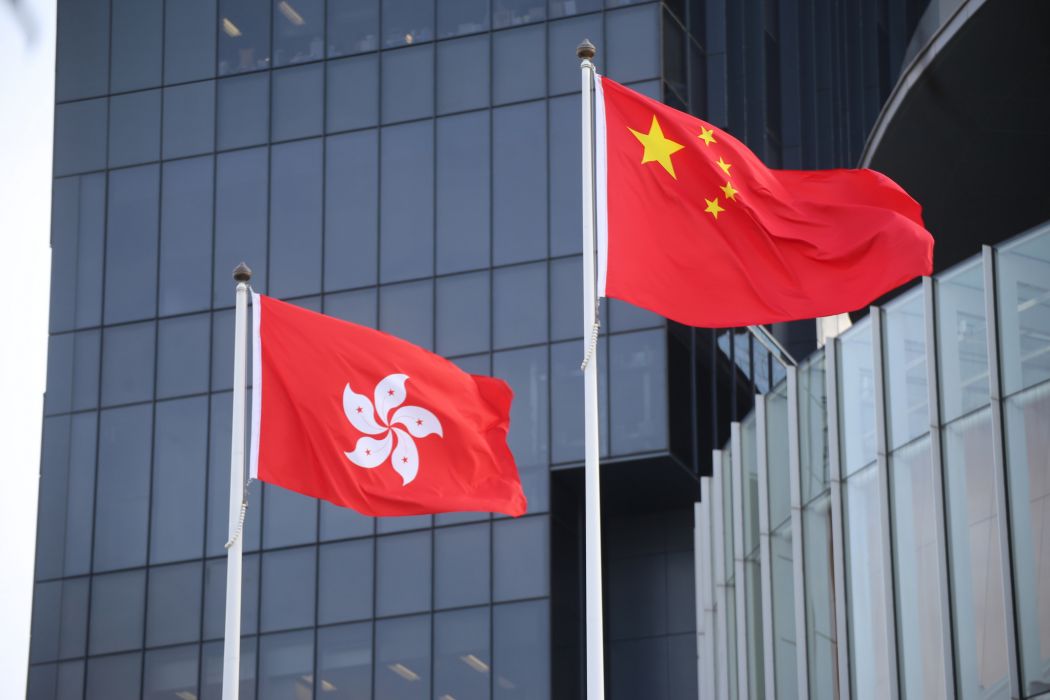
In one additional gesture of open defiance, the most unforgivable from Beijing’s perspective, the new platform aims to connect with the international community by calling for its help in the struggle to resist this intensifying threat to Hong Kong’s rights and freedoms.
These veteran campaigners, even including Joshua Wong, have been dismissed by the new generation of localists and independence fighters for being too gullible, too willing to compromise with Beijing, and not forceful enough in defending the cause they all share.
If the ideas expressed in their inaugural Civil Hub issue are any indication, they suggest just how despondent the mainstream leaders of Hong Kong’s democracy movement have become. They are saying, in effect, if one way doesn’t work, try another.
